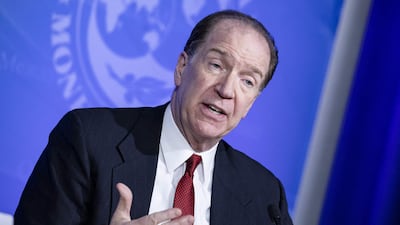The World Bank is preparing a $1.5 billion support package for Ukraine to ensure the continuation of essential government services in the country, which is still under Russian assault, the lender’s president David Malpass said on Tuesday.
Ukraine's economy has been hit hard by Russia's military offensive and is estimated to shrink 45 per cent this year, the bank in Washington said. The magnitude of the contraction will depend on the duration and intensity of the war, it said.
“This [the support plan] was enabled by yesterday’s approval of IDA19 [International Development Association] support of $1bn to Ukraine and $100 million to Moldova by IDA donor and recipient countries," Mr Malpass said.
Through the International Finance Corporation, the World Bank is also providing immediate working capital for companies providing supplies to Ukraine.
“The World Bank was created in 1944 to help Europe rebuild after [the] Second World War … as we did then, we will be ready to help Ukraine with reconstruction when the time comes," he said.
The war in Ukraine is creating sudden shortages of energy, fertiliser and food, with its effects felt globally.
"Food price spikes hit everyone and are devastating for the poorest and most vulnerable. For every one percentage point increase in food prices, 10 million people are expected to fall into extreme poverty," Mr Malpass said.
"The rich can afford suddenly expensive staples, but the poor cannot. Malnutrition is expected to grow and its effects will be the hardest to reverse in children."
Russia’s war in Ukraine could reduce global gross domestic product by as much as 1 per cent by 2023, or about $1 trillion, and add up to 3 per cent to global inflation in 2022 and about 2 percentage points in 2023, the UK’s National Institute for Economic and Social Research has said.
The Covid-19 pandemic, which began in 2020, had already tipped the global economy into its worst recession since the 1930s, and several countries are still struggling to recover.
“Prior to the war in Ukraine, the recovery in 2022 was already losing momentum due to rising inflation and lingering supply bottlenecks,” Mr Malpass said.
“While advanced economies were expected to return almost to their pre-pandemic growth rates in 2023, developing economies were lagging substantially behind … the war in Ukraine and the Covid-19 lockdowns in China are further reducing the recovery path."
Developing country debt has also risen sharply to a 50-year high, at about 250 per cent of government revenues, said Mr Malpass.
"Debt vulnerabilities are particularly acute in low-income countries, where 60 per cent are already experiencing or at high risk of debt distress," he said.
The extraordinary monetary and fiscal policies that advanced economies have been implementing to boost demand, combined with supply constraints and disruptions, have also fuelled price increases and worsened inequality around the globe.
“One measure that captures the growing concern of inflation and inequality is the stagnation in real median income across much of the world. Another measure is the likelihood that poverty increases will continue in 2022 as inflation, currency depreciation and high food prices hit home,” Mr Malpass said.
“Never have so many countries experienced a recession at once, suffering lost capital, jobs and livelihoods … inflation continues to accelerate, reducing the real incomes of households around the world, especially the poor."

Since the pandemic broke out, violence against women and girls in vulnerable regions has intensified, while children have also been affected adversely, the lender said.
“Children lost more than a year of education due to [the] school closures [during the pandemic], with 1.6 billion children out of school globally at the peak of lockdowns, reversing a full decade of gains in human capital,” Mr Malpass said.
The current generation of pupils risk losing $17 trillion in lifetime earnings in present value, equivalent to nearly 14 per cent of today’s global economy, because of the Covid-related school closures, according to a December report by World Bank, Unesco and Unicef.
Looking ahead, Mr Malpass urged governments and central banks of advanced economies to “alter fiscal, monetary and financial regulatory policies that are concentrating wealth and income, misallocating capital and fuelling inflation”.
He also called for keeping markets open and promoting growth and production.
“The path for global recovery is to create policies, financing and innovation that invite investment inflows, allow the investment base to broaden and encourage production to increase,” he said.
"We need to redouble our growth efforts on public and private sector solutions that provide clean water, dependable electricity, sustainable agriculture, quality education, health emergency preparedness and digital access."


